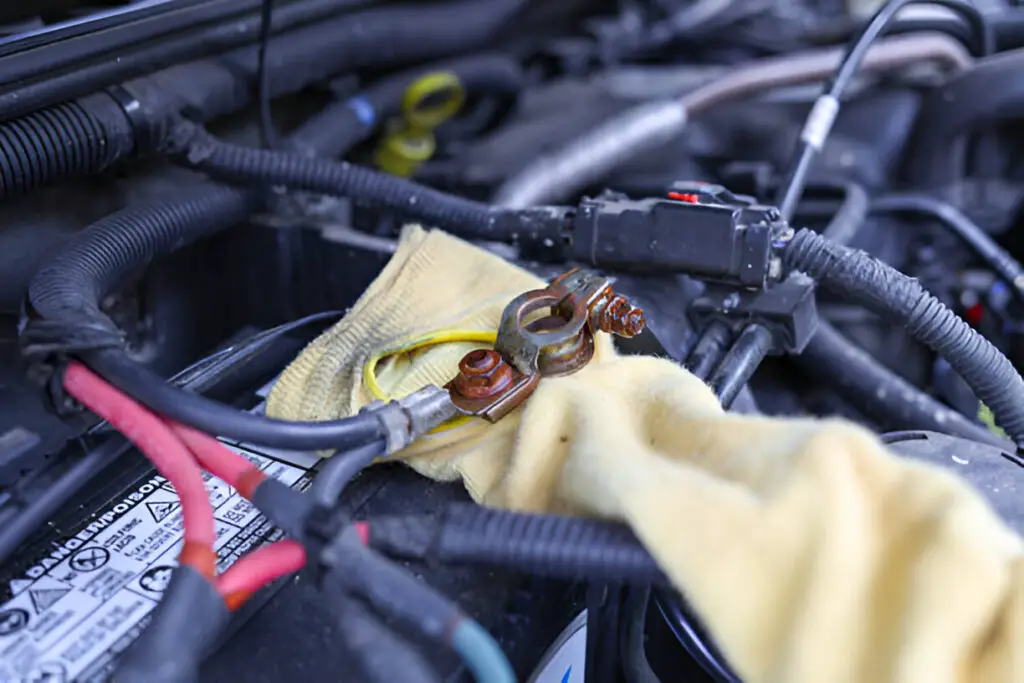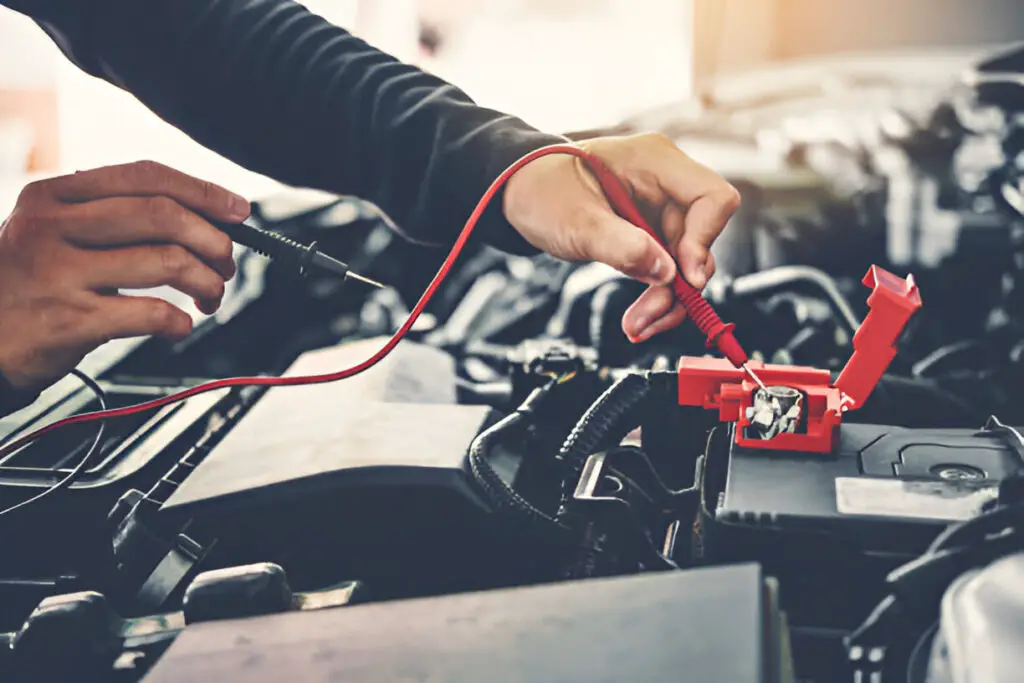A car battery may keep draining due to causes like parasitic draws (such as lights or electronics left on), a faulty alternator, or an old, worn-out battery. Other common reasons include loose or corroded connections, extreme weather conditions, or frequent short trips that don’t allow the battery to recharge fully.
A car battery that constantly drains can be a frustrating problem for many vehicle owners. It’s a common issue but one that requires attention to avoid getting stranded or facing expensive repairs. Car batteries, like most other components, have a limited lifespan, but when they start draining faster than expected, it could be due to a variety of reasons.
In this article, we’ll explore the causes of battery drain, how to diagnose the problem, solutions to fix it, and how to prevent it in the future. At the end, we’ll also address some frequently asked questions related to this issue.

Contents
How a Car Battery Works
A typical car battery is a lead-acid battery that stores electrical energy to start the engine and power electrical systems when the engine is off. Once the engine is running, the alternator takes over, supplying power to the vehicle and recharging the battery.
A healthy battery usually lasts between 3-5 years, depending on usage, weather conditions, and maintenance. However, when it starts draining too quickly, it could indicate a problem with the battery itself, the electrical system, or an external factor.
Common Causes of Battery Drain
Common causes of car battery drain include:
Parasitic Drain
Parasitic drain occurs when certain components or electrical systems in the car continue to use power even after the vehicle is turned off. This may be due to faulty wiring, a malfunctioning relay, or a system that’s not shutting down properly. Some of the usual culprits for parasitic drain include:
- Interior lights (trunk, glove box, or dome lights) left on.
- Faulty aftermarket installations (alarms, stereos, etc.).
- Electrical systems not shutting off properly (like car computers, sensors, or faulty wiring).
Old or Worn-out Battery
A car battery that has reached the end of its lifespan may struggle to hold a charge. Even if your alternator is working perfectly, an old battery won’t hold the power efficiently, leading to frequent draining. Typically, batteries older than 3-5 years will start to degrade.
Faulty Alternator
The alternator is responsible for recharging the battery while the engine runs. If the alternator is malfunctioning, the battery will not be recharged properly, causing it to drain. In some cases, a bad alternator may even cause a parasitic drain, as it could continue pulling power from the battery even when the car is off.
Extreme Weather Conditions
Both extreme cold and heat can negatively impact a car battery’s performance. Cold weather thickens the engine oil, making it harder for the engine to start, which puts more strain on the battery. Hot weather can cause the battery fluid to evaporate, leading to internal damage. Either way, weather-related stress can lead to faster battery drainage.
Frequent Short Drives
Short trips that don’t give the alternator enough time to recharge the battery can eventually drain it. Every time you start the car, the battery uses power, and if the trip is too short, it won’t have enough time to recover the lost charge, leading to a gradual drain over time.
Corroded or Loose Battery Connections
The battery terminals can become corroded over time, causing a poor connection between the battery and the vehicle’s electrical system. Loose connections can also cause intermittent power loss or even lead to a situation where the battery doesn’t charge at all, resulting in a drained battery.
Faulty Charging System
If the car’s charging system isn’t working properly, the battery may not be receiving enough charge to replenish what’s being used. This can happen due to a worn-out alternator belt, defective voltage regulator, or faulty charging cables.

How to Diagnose a Battery Drain Problem
If you’re experiencing frequent battery drain, the first step is to diagnose the root cause. Here’s how:
- Inspect for Visible Issues
Start by checking for obvious problems like corroded battery terminals, loose connections, or lights that are staying on. This is the quickest and easiest way to find the source of the drain. - Perform a Parasitic Draw Test
A parasitic draw test can help you identify whether any electrical components are pulling power when the vehicle is off. You can use a multimeter for this:- Set the multimeter to the amperage setting.
- Disconnect the negative battery terminal.
- Connect the multimeter in series between the negative terminal and the cable.
- If the reading is above 50 milliamps, you may have a parasitic drain.
- Check the Alternator
You can test the alternator using a multimeter. With the engine running, check the battery voltage. It should read between 13.8 and 14.8 volts. If the reading is lower, the alternator may not be charging the battery properly. - Test the Battery
Many auto parts stores offer free battery testing services. You can also use a battery tester to measure the voltage. A healthy battery should read around 12.6 volts when the car is off. Anything significantly lower could indicate a dead or dying battery.
How to Fix a Draining Car Battery
Fixing a draining car battery involves identifying and addressing the root cause of the power drain. Here’s a step-by-step guide to help you troubleshoot and fix a draining car battery issue:
Fix Parasitic Draw
If you identify that a specific component is causing parasitic drain, the next step is to either repair or replace it. This could mean fixing a faulty light switch, replacing bad wiring, or addressing issues with aftermarket installations.
Replace the Battery
If the battery is old or worn out, the simplest solution is to replace the battery. Make sure you choose the correct battery type for your vehicle, and consider purchasing one with a higher cold cranking amp (CCA) rating if you live in colder climates.
Repair or Replace the Alternator
If the alternator is the cause of the problem, it may need to be repaired or replaced. If you’re unsure, have a mechanic perform a charging system test to confirm the issue.
Prevent Weather-Related Drain
In extreme weather, consider parking your vehicle in a garage or using a battery blanket in cold temperatures. You can also invest in a trickle charger if you know your car will sit idle for extended periods.
Regular Battery Maintenance
Periodically clean the battery terminals to prevent corrosion. Ensure all connections are tight, and check your battery’s water levels (if applicable). Also, keep an eye on the alternator belt and replace it if it shows signs of wear.
How to Prevent Car Battery Drain in the Future
Prevention is always better than cure. Here are some steps you can take to avoid frequent battery drainage:
- Turn Off Electrical Components: Always make sure you turn off headlights, interior lights, and any accessories like the stereo or GPS when the engine is off.
- Drive Your Car Regularly: If your car sits for long periods without being driven, invest in a trickle charger or battery maintainer to keep it charged.
- Check for Warning Signs: Pay attention to slow engine cranks or dimming headlights—these could be early signs of battery trouble.
- Perform Routine Checks: Regularly check your battery’s health, especially before long trips or during extreme weather changes.
- Test Aftermarket Add-ons: After installing any aftermarket components like alarms or stereos, ensure they are wired correctly and don’t continue drawing power when the vehicle is off.
Frequently Asked Questions
Here are some FAQs about car battery draining –
1. How long should a car battery last?
A typical car battery lasts between 3 to 5 years, depending on the climate, driving habits, and maintenance. However, factors like extreme temperatures, frequent short trips, or poor maintenance can shorten the lifespan.
2. Why does my car battery keep dying overnight?
A car battery can die overnight due to parasitic drain, such as interior lights being left on, faulty electronics, or a malfunctioning alternator that fails to charge the battery properly.
3. Can a bad alternator drain a battery when the car is off?
Yes, a malfunctioning alternator can cause a parasitic drain. In some cases, faulty diodes in the alternator may allow current to flow even when the car is off, depleting the battery.
4. How can I tell if my car battery is dying?
Symptoms of a dying battery include slow engine cranking, dimming headlights, warning lights on the dashboard, and the need to jump-start the car frequently. You can also test the battery voltage with a multimeter.
5. Should I disconnect the battery if I don’t drive my car for a while?
If you’re not driving your car for an extended period, disconnecting the battery can help prevent drainage. Alternatively, using a trickle charger can keep the battery topped up while it’s not in use.
Conclusion
If your car battery keeps draining, it’s crucial to identify and address the underlying cause to avoid inconvenience or expensive repairs. From parasitic draws to faulty alternators, understanding the various reasons behind battery drain will help you maintain a healthy battery and ensure your vehicle stays reliable. Regular maintenance and routine checks can go a long way in preventing future battery problems.